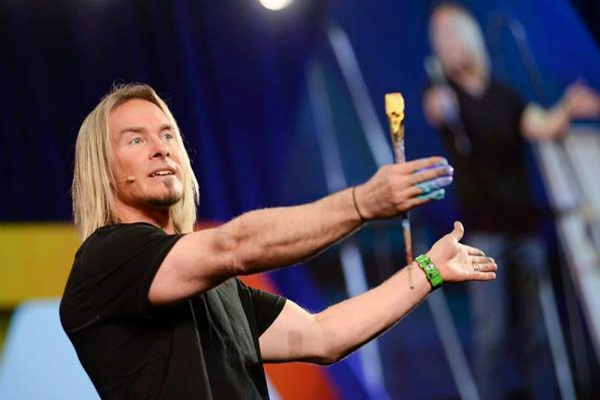The Value Of Art Beyond "Just a Hobby" by Erik Wahl

FAQ: Why do you spend so much time on art with your students? It’s okay for my kid to do as a hobby but not as a career.
Answer: Art is integral to almost everything we do here at NOLI – it is a daily core routine, a basic and essential form of communication, and teaching art has been found to be one of the best practices of education.
That answer was not good enough for some parents, even though their very talented teens went from hating public school to loving our school. The parents were trying to squelch their teen’s passion for art.
We asked inspirational speaker and well-known artist Erik Wahl the question, “What Should We Tell Parents When They Try to Squelch Their Kid’s Passion for Art?”
Erik Wahl and Toni were chatting, early in 2016, about the value of teaching art in the school and not putting up roadblocks.
Toni asked him the question, “How do we best support a student when their parents think that art is ok as a pastime or as a hobby but not as a career choice, when we know that the student’s passion and aptitude is in art?”
We believe Erik’s response would be of great value to parents, students, and their teachers. The attached post is his response to Toni.
Erik Wahl
Erik loved art as a kid, but that love was killed by an “fit within the box” teacher. After college he was in the corporate world doing well but when on the top of the world he lost everything. To put his life back togeather he was directed to return to art. Though his work is now well known, he is best known for his inspirational talks, and his corporate consulting on the topic of creativity.
Erik’s Response
“Toni, this is a sensitive area. Parents want the best for their children. I get it. You and I want the best for their child. Here is what I know - we are losing some of our best most talented creative children because of pressures to conform to the “real world.” I have three teenage boys so I am in the middle of this challenge/opportunity.
What I would relay to parents, adults, leaders and CEO’s is that the process of making art is a process of complex multidimensional problem solving. The skills that these students are displaying are skills that will mature and enhance every area of their problem solving life even if they become engineers, professors, physicians, or attorneys. Art is an opportunity to broaden our thinking skills to be able to navigate ambiguity and master complexity. For sure the “real world” that exists right now will be nothing like the world when these young people exit high school or college.
The best skill they can build on is their mental agility, their ability to adapt and solve problems that have not yet been invented. Art is the key to thinking at this advanced level. Many of the high level companies I consult for now actually say advanced degrees are more disabling than they are ableing because of the myopic worldview they promote.
Successful companies of tomorrow are looking for adaptable moldable talented creative young minds, not formulaic robots that master skills from an industry factory era system that rewards conformity and standardization to obey responsible grown up needs (like food, shelter and security) i get it. but to truly step out into the future of the rapidly changing global consumer driven on demand economy. those standardizations will feel like anvils around the necks of our young kids. we sadly are standardizing our kids for a future that will be obsolete. art is a channel. math is a channel. philosophy is a channel and they all should be included proportionately to develop young people’s minds to become the very best most passionate version of who they are designed to be. Their parents love them. the more they invest in being their cheerleaders and resist the urge to coach the further these young people will advance on their own. I hope that helps.” cheers, Erik
